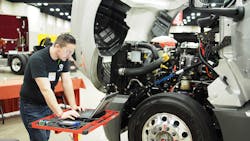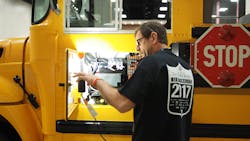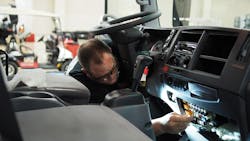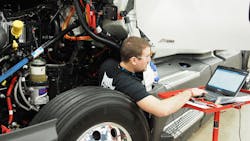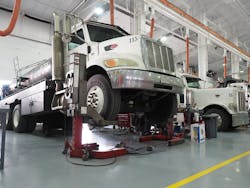The job of truck technician today just might be the perfect modern vocational/trade position. A high school grad can get certified for it faster than a four-year college degree would take, so educational costs are less, but earnings potential out of the gate is nearly comparable—with high demand making it likely the technician will land a position of choice quickly.
Earnings are also more merit-based, since the technician’s skill and aptitude play a large role, and the job itself offers variety and “problem solved” satisfaction that many bachelor’s-holders would envy in their subsequent lines of work. And meanwhile, perhaps most importantly, this is now a strongly computer-based, increasingly high-tech field as much as it involves manual, hands-on work.
Just don’t expect that students out there choosing their potential careers got the memo.
Trucks have changed quite a lot in a very compressed period of time. Over the last 18 years, the onset of computer vs. mechanical engine control has evolved into increasingly data-centric, electronic, automated operation, and trucks have become just as much precision digital instruments as they are industrial-grade hardware.
So, of course, truck technicians have changed right along with what they’re servicing. Work that not long ago was done by feel and trial and error has become an almost surgical process, informed by digital and electronic diagnostics.
“I was there when there were no laptops and electronic tools,” recalled James Nichol, technical team leader for Universal Technical Institute’s (UTI) Finish First program, a manufacturer-specific advanced training course for Daimler Trucks North America covering Freightliner and Western Star trucks and Detroit Diesel engines. Nichol went through UTI’s technician training back in 1986, “and I’ve been working on trucks ever since,” he told Fleet Owner.
He said there’s often something of a disconnect many young students today seem to have when it comes to the truck technician trade. “Some of the misperception out there with high school students is that, ‘Yeah, that’s a dirty, greasy job, and I don’t want to do it,’” Nichol explained.
But if that’s the case, they can’t really be blamed for that narrow view. Students today don’t have the same opportunities that older generations did to get “under the hood,” so to speak. “As I was growing up, people could still work on their cars, motorcycles and things,” Nichol noted. “I think with [vehicle] technology getting so advanced, students just aren’t doing that as much as they used to. They’re not really seeing what’s behind the technician job today.
“They come to UTI today and find out, ‘Wow, you guys are using laptops and computers’—because that’s how you have to diagnose vehicles and heavy-duty trucks,” he continued.
It mirrors what others in the industry have found. At national dealership network MHC Kenworth’s branch in Cheyenne, WY, manager Marc Hess works with a local vocational-technical school to offer students a supervised apprenticeship program that lets them learn from experienced techs and about the job itself.
“Limited resources and few networking opportunities among people in professional trades cause young people to believe that career opportunities in technology outside of computer or mobile app programming largely don’t exist,” said Hess. “Through our mentorship program, many young people are shocked to discover how much technology is involved in maintaining and repairing commercial trucks.
“They’re also surprised to learn how diesel technician training offers an opportunity to gain greater income potential, but at a much lower cost than in a four-year program,” he added.
Troubleshooting today’s trucks
While many students choosing careers today may have more limited exposure to the kind of hands-on mechanical work and problem-solving that pre-Millennial generations commonly had, they’re leaps ahead in that other key aspect of the technician job: computers. It gives them a built-in advantage in learning and using truck diagnostics tools that are now heavily software-based.
“That’s what’s so nice about it—the students do understand apps and software and all that,” Nichol said. And on that note, he added that there’s a kind of “hybrid technician” coming about in commercial truck maintenance as the younger, more innately computer-savvy techs gain advanced mechanical mastery from the older, more veteran technicians and vice versa.
The digital nature of commercial trucks is only getting deeper and more extensive, Nichol pointed out. “Because of the way the manufacturers are designing trucks today, if there’s a problem, the computer’s going to tell you what it is,” he said. With Daimler trucks, the manufacturer’s program is called Diagnostic Link.
How does that work in troubleshooting trucks today? First, the trucks have a communicator that the technician plugs into with a laptop, tablet or similar device. The program interfaces with the truck to determine what’s at fault, narrowing it down to produce a diagnostic “tree” of steps the technician then follows to track down the problem.
“It’s going to give them trouble trees that say, ‘Oh, this code came up? Then you need to check this, then check this,’ and it’ll list it in numerical order,” Nichol explained. “So the technicians would be following that step by step by step. The manufacturers are making this software to meet the needs of those students who can go through the steps listed, and by the end of it, they’ve fixed the truck.”
That kind of precision in diagnostic capability has become necessary as trucks have gotten more and more complex. When these computers on wheels, essentially, are in the shop, drivers and trucking companies aren’t making money, and there’s no time to hunt for needles in haystacks to find and fix what’s wrong.
“The trucks are built to show problems to let technicians fix them correctly,” Nichol said. “We need it to be done right the first time. It’s very highly technical stuff.”
More than just laptops
As you’d expect, truck technicians have to use more than just software in their work. They’ll need to read and follow wiring and parts diagrams, for one thing, and that may come down to flipping through a good old, printed shop manual. Many of those manuals and diagrams have been added to and are accessible in digital and online libraries, however, according to model year, make and vehicle identification number.
Technicians will also need to be skilled in the use of other electronic diagnostic equipment such as a Fluke or Snap-on electrical tester. “The computer said to go to ‘this’ sensor and check for resistance, so the technician will have to get their meter and check it,” Nichol said. “Technicians have to be trained on all those tools as well—there are ohmmeters for resistance, there’s voltage, there’s amperage. They need to know how to use those meters correctly to get the correct response.”
“Otherwise,” he added, “you’ll get a bad reading, and the technician will go back to the truck thinking, ‘Oh, it’s this other component,’ and it’s really not.”
Thus the technician must be able to use all those diagnostic tools to sift through an increasing variety of sensors and electrical devices on the truck adeptly, but don’t forget there’s still all the mechanical, hydraulic and other hardware elements to navigate. “They’re still going to deal with brakes that naturally wear out and have to be replaced and shocks, clutches and so on,” Nichol noted.
“So absolutely, you’ve still got to know how to use a wrench; you’ve still got to know how to look up specs and properly torque down each bolt,” he continued. In that regard, as a technician builds experience and mastery both in diagnostic skills and the range of tools used, the tech will also build that other, less-tangible skill: intuition.
Some techs will reach that point of additional excellence, while others won’t, according to Nichol. “When a truck comes in, a technician might already have an idea of what’s wrong because of his history, but it takes time to get that experience,” he said. “It’s weird, but they’re almost one with the truck—they understand and feel it.”
That heightened, intuitive skill and mastery should be the goal of every commercial truck technician, since it benefits all parties involved. Techs usually are paid according to the particular job done, noted A.J. White, service manager at Rush Truck Center-San Antonio; for example, a brake drum replacement or particular electrical repair would specify “X” number of labor hours.
If the technician can do the job in less than that time, he or she would still be paid that specified number of hours and can move on the next job, increasing earnings. And that’s also good for the dealership or shop, which naturally wants to deliver faster service for the customer and get another truck to repair into its service bays. The truck driver and trucking company also want as little downtime as possible, so interests are aligned all around very well with those of the technician.
Increased specialization
There aren’t enough truck technicians to meet the present demand for them, so it’s a job in high—and growing—demand. And as trucks have become more technologically complex and digitally advanced, there’s also a need for more highly trained, specialized technicians, much like physician specialization in medicine.
“In my advanced program, my seats are always full,” Nichol said of the UTI Daimler Finish First program. “They’re getting great training at UTI, and they can leave with a very good job; they are also finding out that by jumping out of the core program into these manufacturer-specific programs, they can potentially earn a few more dollars an hour,” he explained. “They get more advanced training and credentials, and it puts them that much higher in the food chain.”
Specialization and advanced certification may also be necessary for a dealership. For example, a technician can be certified on the Freightliner Cascadia, and a dealership can’t sell the Cascadia without enough technicians certified to work on the model.
“So the dealers are looking to gobble up these guys,” Nichol quipped. “I think that’s why we’re seeing such high demand in filling our seats.”
There’s another “specialization” of sorts taking place as well. At the same time misperceptions about the truck technician job are slowly being dispelled, so is the traditional presumption that it’s just a job for men, he noted. Back in ’86 when he was certified as a technician, that simply wasn’t the case. “I don’t think there was a female on campus—it just wasn’t there,” Nichol said. But now, although it’s still a small number, he might see a dozen or two women in a class of technicians at UTI.
“I think it’s like a best-kept secret,” he observed. “We have female students come through and ask, ‘How can I be successful as a diesel technician? These parts weigh 100 lbs.’” There are lifts and other aids available for moving that kind of heavy hardware around, first of all, “but there’s also value and a lucrative career in those electronic diagnostic skills as well.”
When a truck comes into a dealership or maintenance shop today, “it’s all about dwell time,” pointed out Rush Truck Centers’ White, and the goal for the shop therefore is to diagnose the problem accurately as quickly as possible. The technician will take that information to a foreman, typically, and then the parts needed for a repair are readied so the work can be done.
The latest electronic developments in trucking are taking that even further, such as with electronic logging devices. Trucks are becoming more “plugged in” and providing better access to their data, and advanced diagnostics systems like Diagnostic Link are connecting the trucks to dealerships and service networks.
It’s all helping shops, technicians and trucking companies do more, and further refining the technician job. A problem with a truck can be identified earlier and more accurately, and the severity of the problem can be determined. Shops can then be located with the particular parts needed for a potential repair in stock.
“Then as that driver pulls into a dealership, they’ve already got the paperwork written up, they’ve got the parts ready to go, and the technician can just come out and confirm that the [truck’s diagnostic system] is right,” Nichol said. And these days, he added, “it’s usually pretty close.”
About the Author
Aaron Marsh
Aaron Marsh is a former senior editor of FleetOwner, who wrote for the publication from 2015 to 2019.
